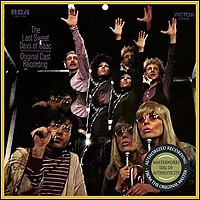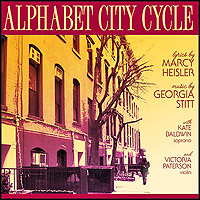
THE THREEPENNY OPERA [Arkiv SONY 51520]
Every time I see or hear another English-language Threepenny Opera, my preference for Marc Blitzstein's 1954 adaptation is renewed. There are those who gripe that Blitzstein cleaned up the language and sentiments of Brecht, and there might well be something in that. But Blitzstein knew how to write song-lyrics in English. Kurt Weill's music is highly musical and remains remarkably vibrant, 80 years after he wrote it. Blitzstein, a peer and competitor best known for his own brand of adventurous theatre music, wrote an English-language lyric of "Pirate Jenny" as an exercise in 1949. Weill liked it — surprisingly? — enough to allow Blitzstein to prepare a whole new Threepenny.
Weill died from a heart attack soon thereafter, but Blitzstein continued work on his adaptation, which would prove to be a phenomenal, Off-Broadway success. Blitzstein, unlike various others who have tried to translate Threepenny into English, was an accomplished lyricist; the words have been adapted to fit the music and the language, rather than slavishly retaining the Brechtian images (and there are a lot of them). Thus, in Blitzstein's adaptation, the songs sound like songs; to me, the other versions sound word-heavy and — well, translated. Which is not, I expect, what they sounded like in Germany in 1928.
Broadway has seen several non-Blitzstein versions of Threepenny Opera, with a clause apparently written into the contract that they must make things more outspoken and more lousy with each attempt. Well I don't suppose that it is written into the contract; it only seems that way. The first of the post-Blitzstein Threepennys was not lousy, in fact. The original cast album of Joe Papp's 1976 production, which has finally made it to CD, is a fine recording. No, it does not have the Blitzstein lyrics; it has a new set by Ralph Manheim and John Willett, over-stacked with 1970-era vulgarities and profanities. Even so, this long out-of-print version is welcome. My one complaint with this reissue, available on disc from ArkivMusic and on-line, is that they have omitted the usual "title page" credits. I have scoured the 16-page booklet but cannot find the names of the translators; the director, Richard Foreman; the producer, Joseph Papp (with Bernard Gersten); or actual credits for Weill and Brecht. Neither is Stanley Silverman, the apparent hero of this recording, identified as musical director (although he contributes a liner note).
This came from the period when Papp and his New York Shakespeare Festival tried to make a go of the Vivian Beaumont/Mitzi Newhouse complex, which had been vacated by the utopian Repertory Theater of Lincoln Center. Papp and Co. moved in back in 1973, giving up after an ill-fated Andrei Serban Agamemnon in 1977. It wasn't until 1985 that the proper mix of art and entertainment was formulated by the same Mr. Gersten with Gregory Mosher, under the name Lincoln Center Theater.
Getting back to Threepenny: No, they don't use Blitzstein's lyrics. For me, The Threepenny Opera simply doesn't seem like The Threepenny Opera without "Mack the Knife" and that shark who bites with the gleaming-white pearly teeth. Even so, Mr. Silverman gives Weill's orchestrations full value, retaining and accentuating the exotic colors that the composer purposely used (led by that Hawaiian guitar). Raul Julia makes an intriguing Macheath; he is supported by Caroline Kaca (Polly), Ellen Greene (Jenny), Blair Brown (Lucy) and David Sabin and Elizabeth Wilson as the pilfering Peachums. Other than Mr. Julia, though, I confess a preference to Lotte Lenya, Jo Sullivan, Bea Arthur and the others on the cast album of the Blitzstein adaptation. That album [Decca Broadway 012 159 463] is one that any fan of the show should have; but this 1976 version does give us a far more vibrant take on the music thanks to Mr. Silverman and his band.
 |
There was a time, prior to the Off-Broadway strike of 1970, when pocket-sized musicals came along at a vibrant clip. Under the then-prevailing conditions, shows like You're a Good Man, Charlie Brown, Your Own Thing, Dames at Sea and The Me Nobody Knows did not seem like undernourished mini-musicals that couldn't make it on Broadway; they were, each and every one of them, grand entertainments in their own right. Among the parade was something called The Last Sweet Days of Isaac, which opened in January 1970 and enjoyed a successful run of over a year (interrupted by the strike). I vaguely recall that it wasn't to my 17-year-old taste; I got a free ticket, somehow or other, and all that I could remember was that I didn't like it. Listening to the original cast album, which has now made a belated appearance on CD, I remember. It started with the title character complaining that he was 33 (very old, I thought). Within minutes he sang a song that went "take off the wig, Ingrid," and it all came back to me. This is the one where the two characters spent one act locked in an elevator and the other locked in prison. The actors, bless 'em, were getting Equity salaries and pension credits for their efforts; the audience, or me at any rate, really felt locked in prison.
The years numbed the memory, but I hated Sweet Isaac. This was the sort of show where the guy walked around carrying a portable tape recorder — a novelty at the time — and sang a song about making a tape and putting it in a can, so the songwriters could write a song about "touching your can." It also reminded me that Austin Pendleton, previously a tailor from Anatevka, was okay in the role of the old man (33 in Act One, 19 in Act Two); the music was performed by a group called The Zeitgeist, which gives you a pretty good idea of the whole thing; and that Alice Playten replaced Fredricka Weber shortly after the opening but there was no way I was going back to see it again. The Last Sweet Days of Isaac did well enough to allow its authors a shot at Broadway, with a somewhat similar but — for me — more interesting fast flop called Shelter. In that case, they exchanged the prison cell for a recording studio with, I think, a singing computer.
Who were those authors, anyway? Arkiv has been doing a good job, but the liner notes for Isaac hide the credits. It took me three passes through the booklet to find Nancy Ford and Gretchen Cryer, hidden in extra-tiny type the same size as the copyright info (or possibly smaller). They also tell us that the show was directed by Word Baker, of The Fantasticks fame; and that it opened "at the Esplanade Theatre in New York City," which I take it to mean the Eastside Playhouse. Listed in that same microscopic pica is the fact that the RCA cast album was produced by a fellow called "Steve Schwartz," who back in 1970 was still dreaming of writing an Off-Broadway musical of his own. Which he did a year after recording The Last Sweet Days of Isaac, with the unlikely moniker Godspell.
 |
Readers of my columns over the last six months might recall my enthusiasm for various efforts of Georgia Stitt ("This Ordinary Thursday"), Marcy Heisler (Dear Edwina) and Kate Baldwin (Finian's Rainbow). PS Classics recently sent over an item from the three of them. "Alphabet City Cycle" it is called, being "A Song Cycle for Soprano, Violin and Piano." (The violinist of the occasion is Victoria Paterson.) This five-song, 20-minute work is available exclusively from iTunes at present. The venture began with a packet of quasi-autobiographical poems Heisler had written and stored away, about facets of her life as a young woman in Greenwich Village. Stitt, a friend and colleague, took one ("Sunday Light") and set it; the results were mutually pleasing enough to get the pair working on what turned out to be a quintet representative of the generation to which the authors belong. The songs are subtitled "The Student on Avenue B," "The Divorcee on Avenue C," "The Widow on Avenue D," "The Jilted Actress in Tompkins Square Park," and "The Lover on Avenue A," which gives you an idea. Stitt, with whom you might not be familiar, has an original and refreshing style; she provides a steady beat, with emotion bubbling through her melodies. Heisler has a gift for unconventional but perfect word images. A mundane lyricist will describe her lover's green eyes, or her lover's sparkling eyes; Heisler sees them as "green and shimmering angry eyes." A divorcee, downsizing to a dark and tiny apartment, says "a prayer for good luck and a bucket of Windex." Heisler can write funny lyrics, as evidenced by the endearing Dear Edwina, but parts of "Alphabet City" show searing and scalpel-like precision. Singers in search of audition or cabaret material be advised that sheet music is already available on-line.
Ms. Baldwin, meanwhile, just might be our next best undiscovered musical comedy heroine. She is lucky to have these Stitt-Heisler songs to sing, and Stitt and Heisler are lucky to have Baldwin. Hopefully, they will find a place to perform "Alphabet City Cycle"; in the meanwhile, fans of any of the three — and the unanointed, open to interesting new work — might want to seek out this mini-album.
(Steven Suskin is author of "The Sound of Broadway Music: A Book of Orchestrators and Orchestrations" as well as "Second Act Trouble," "Show Tunes" and the "Opening Night on Broadway" books. He can be reached at [email protected])










